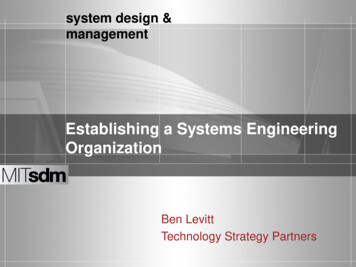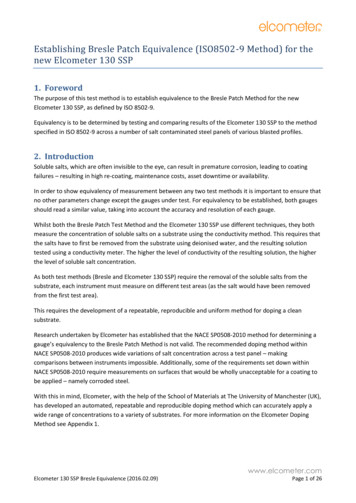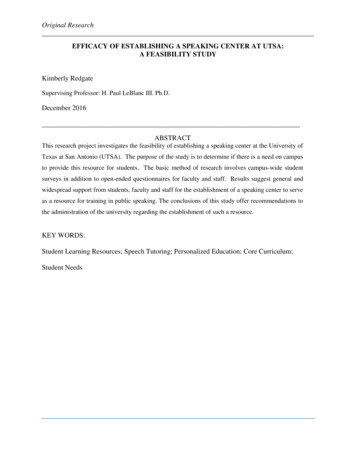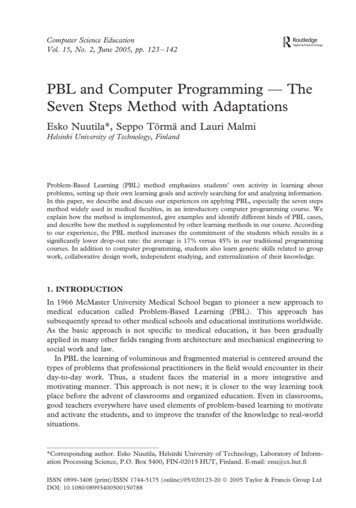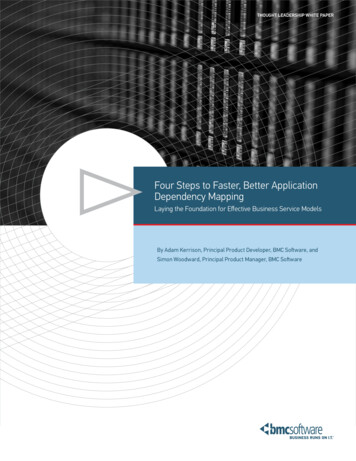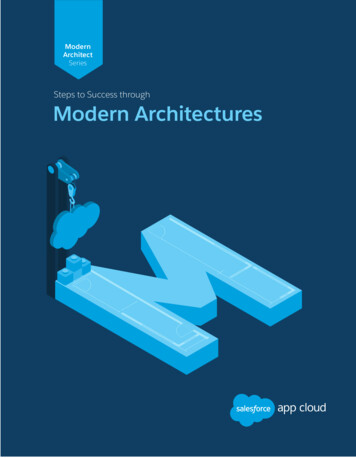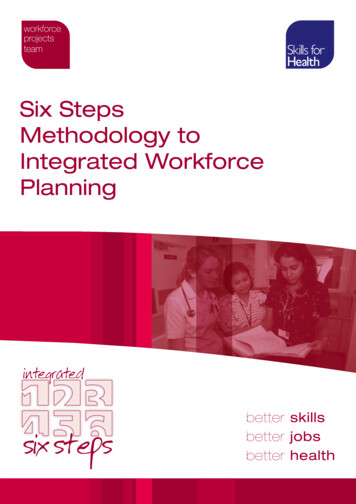
Transcription
20th Annual RTC ConferencePresented in Tampa, March 2007The “Wendy’s Model” ofThe Louisiana Early Childhood Supports andServices (ECSS) Program20th Annual Research ConferenceA System of Care for Children's Mental HealthExpanding the Research BaseMarch 2007Tom Washington, Ph.D.Louisiana Office of Mental HealthRenita Williams Thomas, R.N., B.S.N.Louisiana Office of Mental HealthSteps in Establishing an ECSS SiteProcess of“Franchise Development”1. Select Site: -Central Monitoring and OversightCentral Contract ManagementPolicy & Procedure developed by ConsultantLocal Implementation FlexibilityAdvise Local MH Authority that an ECSS Program can is available2. Establish Implementation Work Group: Local Authority convenes small group who will take the lead in establishing the program(typically five to seven high level local individuals)State ECSS personnel explain the program, distribute informational materials (e.g.,program overview, policy manual, performance expectations) and answer questionsImplementation Work Group contacts potential partners (sister agencies, localorganizations, political leaders and advocates) to build enthusiasm and schedule firstECSS Network Meeting;3. Network Formation Meeting #1: Usually facilitatedProvide basic information including overview of eligibility requirementsIdentify local needs and solicit input on adapting the program locallyBuild enthusiasm and commitmentIdentify potential Network membersSchedule second Network Meeting4. Network Formation Meeting #2 (optional): Review Network #1 and answer questionsDiscuss and rehearse mechanics of referral and service plan development processIdentify “core group” committed to frequent ongoing participationSchedule first ECSS StaffingEARLY CHILDHOOD SUPPORTS AND SERVICESEARLY CHILDHOOD SUPPORTS AND SERVICESNETWORK MEMBERSFY0203As of 12/31/06AcadianaFY0304FY0405FY0506FY0607As of12/31/06147Iberia / St. MartinDelta61East Carroll, West Carroll, Madison and Richland ParishesDeSoto55East Baton Rouge61Lafayette54Orleans36Family TrainingN/A1181971,1921,080Pre K TrainingN/A775271,2901,202Agency TrainingOuachita34St. 63,0632,016Service Plans543535679943521IMH Referrals333395498663417Risk Assessments1
20th Annual RTC ConferencePresented in Tampa, March 2007Customer Care and LocalInitiative in ActionLessons Learned If you ask for input, you must listen and consider whatyou get (Corollary: if you cannot or will not consider allinput, don’t ask for it). The program sites that run into problems are those thatdevelop a “state agency” attitude and stop asking forguidance from their networks. The program managers that run into problems are thosewho make decisions that affect the network withoutconsulting the network. If your customers value what you do, they will make surethat elected representatives know about you. If the State service delivery system understands how youare meeting their needs, they will work with you to figureout ways to keep you in business (although the processcan be painfully slow). Diaper BankGas CardsTranslationJob prepDocumentationVerification of coverageRegistration packetsContact Information Tom Washington, Ph.D.,Director of Behavioral Healthcare, LouisianaOffice of Mental Health, Department of Healthand Hospitals, 628 N. 4th Street, Baton Rouge,LA 70821-4049 (504) 342-2540tpwashi@dhh.la.gov Renita Williams Thomas, R.N., B.S.N.,ECSS Statewide Program Manager, LouisianaOffice of Mental Health, Department of Healthand Hospitals, 628 N. 4th Street, Baton Rouge,LA 70821-4049 (504) 342-2540rwthomas@dhh.la.gov2
EARLY CHILDHOOD SUPPORTS AND SERVICESNETWORK MEMBERSAs of 12/31/06Acadiana147Iberia / St. MartinDelta61East Carroll, West Carroll, Madison and Richland ParishesDeSoto55East Baton Rouge61Lafayette54Orleans36Ouachita34St. Tammany19Terrebonne70
EARLY CHILDHOOD SUPPORTS AND SERVICESFY0203FY0304FY0405FY0506FY0607As of 12/31/06Family TrainingN/A1181971,1921,080Pre K TrainingN/A775271,2901,202Agency rvice Plans543535679943521IMH Referrals333395498663417Risk Assessments
EARLY CHILDHOOD SUPPORTS AND SERVICESNETWORK MEMBERSAs of 12/31/06Acadiana147Iberia / St. MartinDelta61East Carroll, West Carroll, Madison and Richland ParishesDeSoto55East Baton Rouge61Lafayette54Orleans36Ouachita34St. Tammany19Terrebonne70
EARLY CHILDHOOD SUPPORTS AND SERVICESFY0203FY0304FY0405FY0506FY0607As of 12/31/06Family TrainingN/A1181971,1921,080Pre K TrainingN/A775271,2901,202Agency rvice Plans543535679943521IMH Referrals333395498663417Risk Assessments
The “Wendy’s Model” ofThe Louisiana Early Childhood Supports and Services (ECSS) Program20th Annual Research Conference-A System of Care for Children's MentalHealthExpanding the Research BaseMarch 2007Tom Washington, Ph.D. 1Louisiana Office of Mental HealthRenita Williams Thomas, R.N., B.S.N.2Louisiana Office of Mental HealthIn collaboration withAllison Pinto, Ph.D., Department of Child and Family StudiesLouis de la Parte Florida Mental Health InstituteThe Louisiana Early Childhood Supports and Services (ECSS) program is amulti-agency and multi-service system for needy young children and their families.ECSS is funded as TANF maintenance of effort by the Louisiana Department of SocialServices and medical services funded by the Department of Health and Hospitals.The program is built upon local networks of child and family serving agenciesand organizations that serve as the referral source for all children, that participate in thedevelopment of the multi-agency service plan, that accept referrals from the network, andthat guide the local priorities and processes of the program sites.The program operates nine sites serving 13 of Louisiana’s 64 parishes. ECSSserves as the central referral point for young children and their families who would1Tom Washington, Ph.D., Director of Behavioral Healthcare, Louisiana Office of Mental Health,Department of Health and Hospitals, 628 N. 4th Street, Baton Rouge, LA 70821-4049 (504) 342-2540tpwashi@dhh.la.gov2Renita Williams Thomas, R.N., B.S.N., ECSS Statewide Program Manager, Louisiana Office of MentalHealth, Department of Health and Hospitals, 628 N. 4th Street, Baton Rouge, LA 70821-4049 (504) 3422540 rwthomas@dhh.la.gov
benefit from coordinated multi-agency intervention. Services provided by or throughECSS include risk assessment, service plan development and implementation, purchaseof supports or services not otherwise available in the community, and specialized infantmental health assessment and intervention. ECSS also provides training in specializedinfant mental health assessment and intervention for professionals serving in each of thecommunities.Obtaining and utilizing buy-in and collaboration at levels ranging from the Officeof the Governor to local family services organizations was the primary developmentstrategy. Although there was no difficulty in getting state and local agreement to theoffer of additional mental health services for families and children, creating a sense oflocal ownership and commitment was key to successful implementation. A concept,characterized as “The Wendy’s Model” by the first program director, guidedimplementation. The model is one in which the sponsoring agency, in this case theOffice of Mental Health, brings into the community the basic infrastructure (funding,policies, personnel, training), but sustaining the program is dependent upon the success ofthe local manager in developing a program that the community supports, commits to andpatronizes.At each step of program implementation, local input was assured by tapping intointerlocking personal and professional relationships to develop the local network.Ongoing local support has been assured by listening to and implementing local guidanceand priorities.The developers of the program considered the process to be one of “franchisedevelopment” involving:
-Central Monitoring and Oversight-Central Contract Management-Policy & Procedure developed by-Local Implementation FlexibilityConsultantThe long-term strategy for development is based upon creating a system ofservices that the local community cannot imagine being without and one that providesservices that are recognized as necessary to the overall smooth operation of the Stateservice delivery system.Early Childhood Supports and Services (ECSS) is now in its fifth year. With ongoing local and state-level support, the program has steadily grown and is currentlypiloting the next phase of its development which involves transferring operationalresponsibility from the state mental health authority to local mental health authoritiesultimately leading to state-wide program access. Along the way, many lessons have beenlearned in negotiating initial funding, developing the program infrastructure (includingpolicies and performance expectations), and facilitating the development of the localnetworks of child and family serving agencies and organizations.Here are some of the lessons learned so far:o If you ask for input, you must listen and consider what you get (Corollary: if youcannot or will not consider all input, don’t ask for it).3o The program sites that run into problems are those that develop a “state agency”attitude and stop asking for guidance from their networks.43Considerable energy is invested in convincing local partners that they really do have a say in theprocesses and priorities and that this in not just another state mental health clinic; a single incident of “askbut don’t listen” requires rebuilding that trust; if local input will not influence a decision, such as eligibilityrequirements dictated by the funding source, simply provide the information.
o The program managers that run into problems are those who make decisions thataffect the network without consulting the network.5o If your customers value what you do, they will make sure that electedrepresentatives know about you.6o If the State service delivery system understands how you are meeting their needs,they will work with you to figure out ways to keep you in business (although theprocess can be painfully slow).7This model has the potential to serve as a guide for other states seeking to developintegrated early childhood services and supports within local communities, both throughthe State Early Childhood Comprehensive Systems grants and through other legislativeand funding methods.4Unlike many other state services, the ECSS model offers broad latitude for local influence on both thescope and detail of program operation. If that model is abandoned, local belief that ECSS is a locallydriven program evaporates and the number of local stakeholders interested in using their influence orposition to assist the program drops quickly.5Operational decisions, such as how to manage waiting lists, that are made without consulting the partnerswho are affected (or whose referrals are affected) are seen as arbitrary and lead to withdrawal of support forthe program.6ECSS has needed to rely on its local support base to provide information and advocacy to elected officialsin ways that Civil Service employees cannot. Local support and advocacy lead to the first major programexpansion by advocating for an increased appropriation.7State-level customers (such as funding sources and clinical training institutions) who recognize that ECSSreflects well on them (exceeding targets, non-problematic operations, good press, demonstration of theeffectiveness of specific service delivery approaches and favorable public recognition) provided supportduring a fiscal crisis that threatened a 50% reduction in the program and are currently supporting legislativeaction that could lead to doubling the size of the program.
Steps in Establishing an ECSS Site81.2. 3.4. 8Select Site:Advise Local MH Authority that an ECSS Program can is availableEstablish Implementation Work Group:Local Authority convenes small group who will take the lead in establishingthe program (typically five to seven high level local individuals)State ECSS personnel explain the program, distribute informational materials(e.g., program overview, policy manual, performance expectations) andanswer questionsImplementation Work Group contacts potential partners (sister agencies, localorganizations, political leaders and advocates) to build enthusiasm andschedule first ECSS Network Meeting;Network Formation Meeting #1:Usually facilitatedProvide basic information including overview of eligibility requirementsIdentify local needs and solicit input on adapting the program locallyBuild enthusiasm and commitmentIdentify potential Network membersSchedule second Network MeetingNetwork Formation Meeting #2 (optional):Review Network #1 and answer questionsDiscuss and rehearse mechanics of referral and service plan developmentprocessIdentify “core group” committed to frequent ongoing participationSchedule first ECSS StaffingThe process, from formation of Implementation Workgroup to first ECSS Staffing, has taken as little assix weeks and as long as three months (one site implementation was delayed for nine months due toinclement weather; the Network Formation Meeting was repeated)
ECSS Multiple Entry Referral Points
Customer Care and Local Initiative in ActionRenita Williams Thomas, R.N., B.S.N.Early Childhood Supports and Services (ECSS), provided through the Louisiana Officeof Mental Health, is a multi-agency collaboration designed to provide services andsupports to young children (ages birth thru five years) and their families who are at riskor who are demonstrating emotional and/or behavioral difficulties. Our primary focus ison improving collaboration among providers of infant mental health services.In the Wendy’s model of care each office has the same “blueprint” for operation but weencourage the local programs along with their Network Partners to develop a functionalmethod of operation that is practical for their individual community.The approach from the management perspective is to encourage flexibility in each servicedelivery area and region. It is our hope that the community network partners along withthe local office utilize creative ways that best stretches both the state and local resources.It is often after I think that I have seen and heard everything that I get yet another phonecall with a new spin on a method for client service delivery.For instance, in our more rural area, the local Wal-Mart sends them a steady supply ofdiapers to stock their diaper bank. This is helpful not only to our clients but to othermembers of the network collaborative who may have clients in need of such items. Allsites operate at different capacities but with the similar goals for service delivery. Theywork collectively to meet the established TANF goals for each fiscal year.Other examples of local autonomy include a collaborative effort between ECSS Delta andtheir network to provide transportation to clients in an effort to assist them in keepingappointments associated with their established Service Plan. Many of their familymembers do not have transportation but those who have transportation but do not havemoney for fuel.Several faith based organizations have partnered to provide gas cards to many of ourclients in need.Another fascinating piece is the partnership with Families Helping Families. In additionto their contracted duties, a Hispanic employee has been given dedicated hours to providetranslation services to our new and ever increasing Spanish population.Network members in the devastated New Orleans area work with ECSS to fast trackfamilies into the local HeadStart programs and staff at the Louisiana Department ofLabor assists this office greatly in informing them of job openings in the community andassisting them in with tips such as resume preparation, interview techniques, etc. andother information that may be needed for successful job preparation.The Terrebonne network is a vast and tremendous one. Among the many networkcontributions, one that stands out at this location is that the Office of Family Supportsassists by providing documents such as food stamp printout, FITAP assistance
verification, kinship care assistance etc. Many of our clients lack organization andsimply can’t (or don’t) bring in the necessary forms/documentation. This is a veryvaluable service to those who are especially in immediate need.Also, their local Medicaid representative provides verification of coverage for familiesseeking services. Finally, Terrebonne Parish HeadStart now includes our ECSS RiskAssessment Form as an integral part of their registration packet for every childparticipating in their program. Also, a HeadStart child receives additional disabilitypoints (according to their system) if a child is participating in ECSS but more specificallyenrolled in the Infant Mental Health component.Staff is encouraged to consult their local networks to determine what supplies and/orservices will be afforded to clients. Each service plan is developed, critiqued andfollowed by utilizing our network partners as the “driving force.”This method gives sites and their network partners the freedom to work with theresources of their local community to meet the every changing and vast differential needsof the clients to which they provide services. This has been a hugely successful ventureand the communities enjoy being able to take a more regional approach to meeting theneeds of their citizens.
“Franchise Development” - Central Monitoring and Oversight - Central Contract Management - Policy & Procedure developed by Consultant - Local Implementation Flexibility Steps in Establishing an ECSS Site 1. Select Site: Advise Local MH Authority that an ECSS Program can is available

